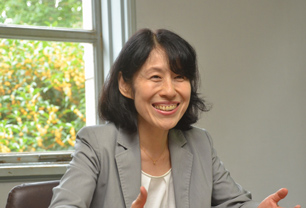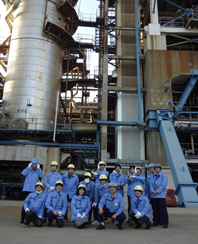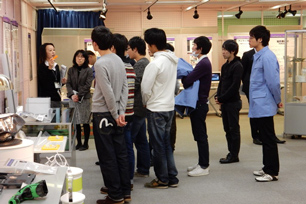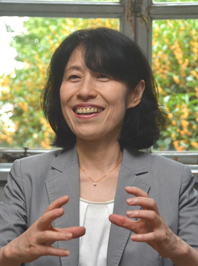Professor Eri Yokota, Faculty of Business and Commerce, Using Accounting Information to Better Manage People and Organizations
*Position titles, etc., are those at the time of publishing.
Eri Yokota

Professor Yokota graduated from the Faculty of Economics at Gakushuin University in 1983. She obtained her master’s degree in 1989 from the Graduate School of Business Administration at Keio University, where she also completed doctoral course requirements in 1995. After serving as an assistant professor, associate professor, and professor at Musashi University, she has been professor at Keio University since 2005. She has a Ph.D. in Business Administration (1997, Keio University). Prof. Yokota’s research interests are management control, performance evaluation, and organizational and human behavior. Her main publications include Furattoka soshiki no kanri to shinri: Henka no jidai no manejimento kontororu (Management and psychology in the flat organization ) (Keio University Press), Management Control: Yattsu no kesu kara kangaeru hito to kigyo keiei no hokosei (Management control: understanding people and business management through eight case studies ) (co-authored; Yuhikaku Publishing), and Genka kanri kaikei nyumon (Cost and Management Accounting) (co-authored; Chuokeizai-sha).
How do people’s actions and behaviors change depending on what their goals are and how they are evaluated?

──I understand that you specialize in management control, which is a term most of us are unfamiliar with. What kind of field of study is it?
In short, it is a management system that uses information to achieve both total and partial optimization of an organization. Essentially, the information we use here refers to quantitative data, largely based on accounting information, but management control has come to be used in a broader context. In terms of the academic discipline, it is positioned on the boundaries of organizational theory, theory of organizational behavior, and accounting. More recently, within management control, issues of strategy formulation and implementation have become more and more important, and therefore its positioning may have shifted somewhere between business administration and accounting.
It was R.N. Anthony, an American professor of accounting at Harvard Business School, who introduced the concept of management control. In the beginning of the 20th century when companies in the US started to grow larger and become more diversified at a rapid pace, accounting information was used effectively to manage large organizations. Against this backdrop, Anthony developed the study of management control in the 1960s. There are various ways to control an organization, such as through charismatic leaders or permeating corporate values throughout the company. However, instead of a command and control style management approach, the management control system is about running a business by building a structure in which managers who have authority over the sub-units of the company work with the goal of improving their division’s performance, which then benefits the overall organization.
What I find most interesting within this system is that people do not have a sense that they are forced to do something, but that their personal efforts will also benefit the entire organization. In this process, management accounting plays a crucial role because building good accounting information and other management systems can positively affect the motivation level and behavior of the employees. Therefore, for the organization to achieve its goals there needs to be a system of management, and when formulating this system, we must take into consideration how it relates to human psychology. This relationship between management control system and psychology is what I found particularly interesting.
──What do you mean when you say accounting information affects the behavior of the employees within an organization?
In order to achieve the objectives of the company, people in positions of responsibility (such as managers) over the departments of the organization must understand the objectives of both the entire company and their own department and be able to guide their staff toward those objectives. As managers gain more authority, they tend to focus only on business activities that optimize their own departments without sufficient regard to the impact of the overall process. The system that tries to make the activities of the individual departments optimal also for the entire organization is management control. Accounting information can be used to set numerical targets and to evaluate performance, which translates to the outcome of business activities. By building a business structure in which the actions of the managers and the organizational members is linked to the profit of the company, both partial and total optimization can be achieved simultaneously.

──What was the reason you became interested in management control?
After studying economics at university, I became a local civil servant. In this organization, staff from each of the 23 wards (special wards) in Tokyo were assigned to other ward offices. The 23 wards shared the same human resource management systems and civil service examinations, which were coordinated by one office. During my time working there I noticed slight differences in how the staff in each ward understood and approached their work, even though the actual work they were doing was not so different. After my stint there, I entered Keio’s Graduate School of Business Administration (Keio Business School) and wrote my master’s thesis on the relationship between the motivation of people working in the frontline and the way top management thinks. The subject of my research was the 23 ward offices in Tokyo. I looked at how the motivation of the employees in the different wards was related to the way the mayors of the wards thought about the direction and management of the organization. Back then, I was interested in the relationship between members of an organization and leadership. However, after working in various jobs, including doing some consultation work, I realized that although strong leadership is important in bringing a company together, the system that is based on the infrastructure of business activities can also have tremendous impact. After that, I learned about management control from Professor Fushimi while I was pursuing my doctoral degree.
──Can you please explain to us how you conduct research?
In practice, accounting management is not always done the way it is taught in the textbooks, and most of the time, it is not open to the public. Therefore, I believe that it is important to visit the companies and talk directly with staff who are in charge of accounting, corporate planning, human resources, the managers of each department, or people who work in the frontline. How companies set goals and implement systems, such as evaluation methods, that are basic to business management varies from company to company. One cannot collect all the information about the company, but when I conduct research, I not only try to verify my theories, but I also take into account multiple possibilities.
This is an example of when the textbook method does not work well.
================================
The founder and owner of a supermarket chain always made sure to know each store manager well so that he can entrust them with the running of each store. At the same time, when the situation called for it, the owner himself directly spoke and offered advice to the managers—and that was how the business expanded. The second successor of the company made full use of his knowledge in business administration, which he acquired at university, clarified the company’s financial goals and started to give out firm instructions to the store managers regarding budget planning and cost saving. As a result, it became clear that it was too costly to keep running the company under the founder’s self-taught style of management that was closely tied to the local communities, and managing the business became strained.
================================
The size of the company when it was established was small, so it was possible to operate the business without a proper system in place. However, as the head of the company was replaced the second or third time around, the business ceased to run smoothly. So systems that use budgets and company goals were then implemented to manage the company. According to textbooks, the method that the second head of the company used is a straightforward solution to the problem, but somehow it did not work well. So we need to figure out why. To research this issue, we need to formulate a hypothesis on the relationship of different elements that support a system, which aims for partial or total optimization of an organization. To do so, we need to take into account not just the accounting management system but also related factors that support this system such as the human resources management system and corporate strategies. The example I used above is actually a case study for my case discussion class. In this class, students talk about what we need to think about in these types of situations, and quite often new ideas are born from these discussions.
However, one problem with the type of research we conduct is that even though we construct hypotheses, it is very difficult to verify them. As I mentioned earlier, in reality, a multitude of factors influence each other in complex ways. Recently in the field of accounting management, there are researchers who are taking an experiment-based research approach, in which they try to understand the behavior and psychology of the research subjects through business game-like experiments. I find this new approach very intriguing.
The future of management control that is unique to Japanese companies

──Do you see changes in the systems of Japanese companies as a result of globalization?
I found that in the past, certain characteristics of management control in Japanese and US companies were different. However, as we approached the 21st century, an American results-oriented way of management was becoming popular. Back then, I was watching with interest whether this approach would take root within Japanese companies as well, because if it did, I anticipated that it would be a system much like what Anthony advocated. Now the results-oriented approach to doing business has become very much a part of Japanese companies, but that is not to say that they followed the management control textbooks. In this respect I believe that the concept of long-term employment in Japan has had a huge influence. A company must have some kind of appealing quality for the people to decide to work there long term. That is why Japanese companies, while preserving the living wage and seniority-based systems, developed a unique compensation system in which evaluation of short-term performance is paid in the form of bonuses and long-term performance is reflected in basic wages.
At the same time, with long-term employment, as the amount of time an individual spends in the same company is quite long and there is constant reshuffling of staff, there is good flow of information within the company. Even if the structure of the company is top-down, the information flow does not always follow that direction, and instead, a lot of the important information flows horizontally—this aspect combined with the long-term employment and human resources management systems has been at the basis of business activities—and this is one distinct aspect of management control within Japanese companies.
──What kind of areas are you researching now?
Two years ago I had the opportunity to live in Finland for a while. Finland is famous for being an innovative country. I researched Finnish companies while there and I am trying to shed light on what kind of management control system is nurturing Finnish innovation.
At the same time, I requested an interview with the head of a Japanese company in Finland to learn more about the differences between Finnish and Japanese companies. If Japanese companies are not able to easily change the existing management control system, and furthermore, if this system has been the strength of Japanese companies, I believe that it is possible for them to work the current system to their advantage to achieve globalization.
Having said that, if long-term employment is the reason the management control system has not changed within Japanese companies, then what will happen to this system, which controls the entire organization, when long-term employment practices become a relic of the past? I find this extremely interesting, as it would present a huge opportunity for Japanese companies to change in a drastic way.

──What is the most interesting aspect of your research on management control?
I find it very interesting that it is possible to merge the results born from the employees’ actions and behaviors with organizational objectives through the various systems within an organization and collaboration among these systems. Leadership is of course important, but by building systems, the employees’ daily efforts in bringing about good results for themselves contribute to the overall optimization of the organization. This is easier said than done because the process is complicated, and the situation is different for each company. However, I believe these companies must essentially share a common thinking. Identifying these similarities is difficult, but it is very rewarding at the same time.
Ultimately, I would like to construct a new management control framework as a solution for companies when they confront new challenges and changes. As with long-term employment, when the parameters of the system collapse, we need to think about what to prioritize in order to align the actions and behaviors of the employees with organizational objectives. We need to carefully investigate case examples at various companies, continually moving back and forth between reality and theory. By repeating this process, I am pursuing this research in the hope that I can one day propose a new and pioneering framework for management control.
*This article appeared in "Kenkyu Saizensen" (October 22, 2015) of Keio University Japanese Website.
*Position titles, etc., are those at the time of the interview.
